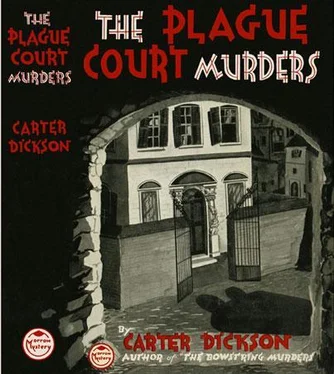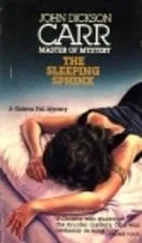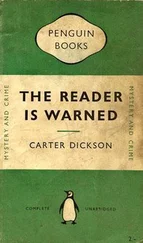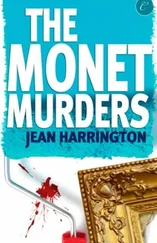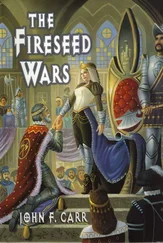Her cheeks were flushed, and her speech rapid to incoherence, Ted let out a whinny of laughter.
He said: "I say, angel, I shouldn't go on like that, you know. You're only providing motives for murder."
"Well, well," said Halliday, and took the cigarette out of his mouth. "Want your face knocked off, do you?"
Ted studied him. Ted was very much the young intellectual then, drawn back a little, supercilious, touching his sprouting mustache. He would have been ludicrous had it not been for the fighting fanaticism of his eyes.
"Oh, if it comes to that, old son, motives for all of us. With the possible exception of myself. And that's unfortunate, because I haven't much objection to being accused...." It was the very familiar aloof Chelsea strain, and I think he caught Halliday's slight grimace, for his face hardened; he went on rapidly: "Especially as they'll never be able to arrest anybody. Yes, I believed in Darworth, and I still do! It seems to me you're all doing a hell of a lot of shuffling and sliding, the moment someone says, `Coppers!' Let 'em come! I'm glad of this, in a way. It'll throw a demonstration of the truth at the whole world, and the morons who've always tried to block every bit of real scientific progress-" He swallowed hard. "All right, all right! Say I'm potty, but this will have demonstrated it to the world. Now isn't it worth a man's life and what's a man's life compared to scientific…”
"Yes," said Halliday. "You only seem to be interested in man's life after he's dead. As for the rest of it, I've heard all that poisonous nonsense before." He looked at the other sharply. "'By the way, what are you getting at, anyhow?"
Ted thrust out his neck. He tapped his finger slowly on the back of the chair. His head was wagging, and his face screwed up into a probably unintentional sneer.
"Only this, my boy. Simply this. We're not altogether without brains. We heard your policemen smashing down that door; we heard a good deal of what was said, and what's thought. . . . And until your Scotland Yard can tell us how Darworth was killed, I'll keep my own ideas."
He glanced across the hearth, as though carelessly, and his eyes narrowed. Inexplicably, we must all have experienced a sense of shock to see that Lady Benning was sitting up.
She was dry-eyed now, but so dull of face that the black-lace gown, all the elaborate deckings out of a, shell, became harsh travesty. On God knows what impulse-but I remembered it afterwards - Major Featherton bent over and settled the cape about her shoulders. With the red-lining gone, she became a somber part of the gloom. Only the bracelets on her arm glittered as she put her elbow on the arm of the chair, her flabby chin against her knuckles, and stared down as though at flames in the dead fire. She hunched her shoulders, drearily.
"Thank you, William," she said. "These courtesies-! Yes. Yes, I am better now."
Featherton said gruffly: "If anything's upset you, Anne,
"No, you won't, William." Her hand slid up as his big shoulder lifted. It was comedy, or tragedy, or whatever you like. "Ask Mr. Blake, or Dean, or Marion," she went on without lifting her eyes. "They know."
"You mean, Lady Benning," I said, "what Joseph told us?"
"In a way. Yes."
"Seriously, then: had you never suspected Darworth of being an impostor?"
We heard voices begin calling outside the house; a hail, somebody's answer, the clumping of footsteps coming nearer. A muffled voice at the front said: "Carry y'r own ruddy tripod, can'tcher? Were the 'ell? ..." Somebody replied, there was a mutter of mirth, and the footsteps clumped on round the side of the house. Lady Benning spoke.
"Suspected? We do not know Mr. Darworth was an impostor. If so, I am sure of one thing. . . . They are not impostors. They are real. He tampered with them, and they killed him."
There was a pause. She felt the atmosphere.
"I am an old woman, Mr. Blake," she said, looking up suddenly. "I had very little to make me happy. I never asked you into my life. But you came into it, with your - your great boots, and your bullyings of half-witted children like Joseph - and you trampled that little garden down. For the love of God, my friend, in the name of His mercy, do nothing more!"
She pressed her hands together, and turned away.
"Part of it, Lady Benning," I said, "would seem a very terrible gospel. Were you made happy to think, or did you really think, that your nephew could be possessed, and go amuck like a devil?"
For answer she regarded Halliday.
"You! Oh, my dear boy, I don't doubt you're happy. You're young, you're rich, you have a beautiful girl...." Lady Benning spoke with soft malevolence, turning out her wrist as she uttered each phrase, so that she sounded horribly like a burlesque Shylock. "You have health, and friends, and a quiet bed at night. Not like poor James, out there in the cold. Why shouldn't you worry and squirm a little? Why shouldn't that pretty doll, with her lips and her fine body, why shouldn't she sicken and worry her heart out? Do her good, instead of so much kissing. Why shouldn't I encourage it? . . . It wasn't you I worried about. It wasn't for you I wanted this house cleansed. It was for James. James must stay there in the cold until the foul thing is gone out of this house. Perhaps James is the foul thing---“
"Anne, my dear old friend!" said Major Featherton.
"Good God, this won't do.... "And now," Lady Benning went on, in a sharp but very
matter-of-fact tone, "Roger Darworth has cheated me. Very well. I only wish I had known it sooner."
I restrained Halliday, who was regarding his aunt with incredulous eyes, and he had started to say, "You encouraged-" I said quickly:
"Cheated you, Lady Benning?"
She hesitated, seeming to come to herself. "If he was an impostor, he cheated me. If not, he still failed to exorcise what is in this house. In either case, it slew him. He failed. And therefore he cheated me." Lady Benning lay back in her chair and commenced to laugh, in shuddering convulsions, as though she had made a hilariously witty reply. Then she wiped her eyes. "Ah, ah. I mustn't forget. Was there anything else you wanted to ask me, Mr. Blake?"
"Yes. Something I should like to ask everybody.... A week ago tonight, I am given to understand, there was an informal gathering at Major Featherton's flat. At this gathering, Mr. Darworth was persuaded to try automatic writing. Is that correct?"
The old lady turned and prodded at Featherton's coat.
"Didn't I tell you?" she demanded, in malevolent triumph. "Didn't I tell you, William? ... I knew it. When that police-officer came in here a while ago, and tried to bully us, he had a younger man with him. Another policeman, the one who took charge of Joseph. He didn't show his face to us, but I knew who it was. It was the police spy they sent to us, and we received as a friend."
Ted Latimer jumped up. "Oh, I say! That's utter rot! Bert McDonnell--oh, yes, I know!-I thought I recognized him, in the dark, when he came in after that log, and didn't answer when I spoke to him ... but, damn it, that's impossible! Bert McDonnell's no more on the police force than I am. The idea's absurd. Fantastic.... Look here, it isn't true, is it?"
I evaded as well as I could, by referring them to Masters, for I wished no more digressions. Halliday, I could see, was preventing Marion from speaking; and I kept my eyes on Major Featherton while I sketched out what we knew of the evening. The major seemed uneasy.
`And we are informed that Darworth was terrified, apparently by what he saw on that paper... " I glanced round.
"Yes, by Gad, he was!" Featherton blurted, and drove one gloved fist into his palm. "Funk. Sheer funk. Never saw it worse."
Ted said blankly: "Yes. Yes, it must have been Bert...."
Читать дальше
